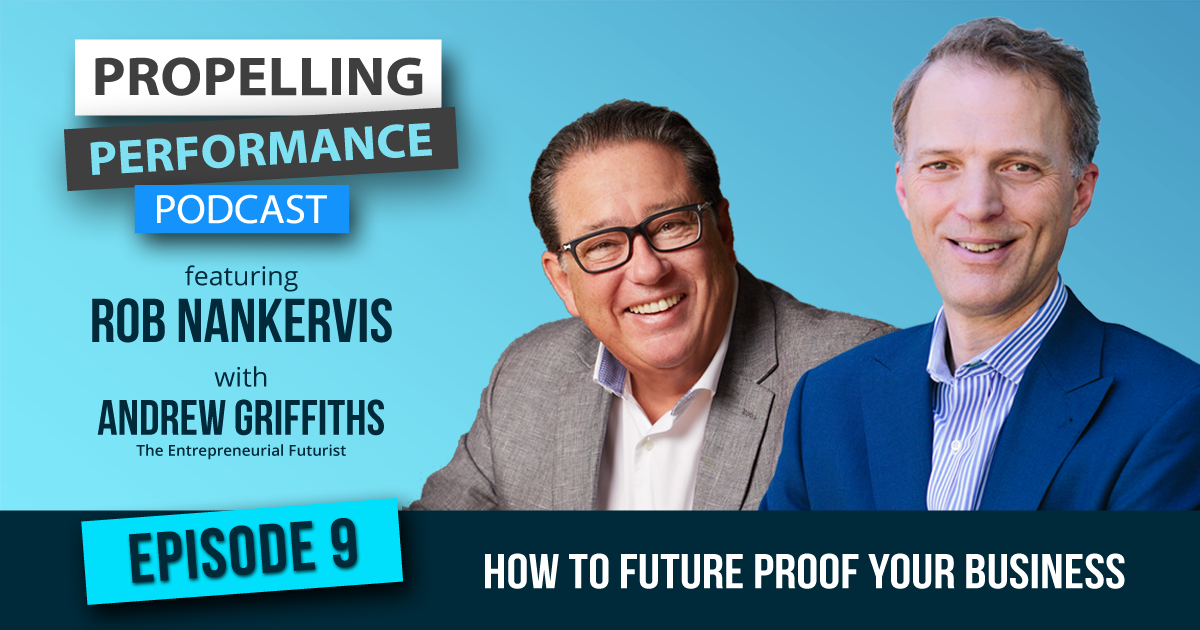Propelling Performance Podcast
Episode – Nine
featuring Rob Nankervis with Andrew Griffiths
In Episode Nine, Andrew Griffiths talks about future proofing your business. Andrew specialises in future-proofing businesses across virtually every industry and every corner of the planet. At a time in history when we are all struggling to think about what the future holds, Andrew provides us with a crucial reminder that as leaders, we must be consciously and consistently future proofing our businesses, not just during times of crisis. Using real life examples and Andrew’s own global client base, we explore the biggest mistakes companies are making right now, why we must know how to adapt to survive and Andrew’s seven-step framework for future-proofing yourself and your business.
“Failure to evolve in a rapidly changing world is really what sums up the challenge for most businesses. That’s why we’re seeing so many industries and so many businesses failing right now. We blame COVID for it, but the reality is, they had old models in a new world.” – Andrew Griffiths
Listen to discover:
The demand for evolution and ‘new’ is a reflection that we need to keep up with our customers and their changing world, their appetite for new.
The three big mistakes we’re making that impact the future of our businesses…
- Not staying relevant to our customers
- Not evolving in a rapidly changing world
- Not communicating transparently.
We must know how to adapt to survive. Alvin Toffler, who wrote the book Future Shock, said “The illiterate of the 21st century won’t be those who can’t read or write, but those who can’t learn, unlearn and relearn.”
“Being around for a long time doesn’t guarantee you success anymore. For the first time in history, we need to market in a multi-generational way. A Baby Boomer might want to know you’ve been in business for 50 years, but to a Millennial, that means you’re probably old and outdated.”
“As soon as an Excel spreadsheet becomes more important than a conversation with a customer, our business is in trouble.”
Build extraordinary relationships with clients and customers, to the point where we’re ingrained in the evolution of where they’re going and we’re a part of it.
Build a brand that is more inclusive and relevant and communicate at a much more transparent level.
The seven step framework for future-proofing yourself and your business…
- Look critically at your business model. Are you working on an old model in a new world?
- Embrace everything new and being new. Don’t throw out the old, but you’ve got to embrace the new.
- Build a bulletproof brand as a company.
- Create experiences. Move away from the transaction economy.
- Be transparent and build trust.
- Communicate more wisely, in a way that is more engaging, with more storytelling. Share more stories about what you’ve got wrong, as much as what you’ve done right.
- Stay relevant and so tightly connected to your customers that you are involved in their decision-making process. You need to be one step ahead of them all the time, developing a product or service just as they need it.
Explore incredible examples of future-proofing during COVID here: https://www.covidinnovations.com
“These are the moments in time where everything is speeding up, so we react quicker. If our business model is broken and not working, instead of a slow death, it becomes a quick death.” – Andrew Griffiths
“It’s not the big things that we lose customers about, it’s the little things. Lots and lots of little things ultimately frustrate people and make them go somewhere else.” – Andrew Griffiths
Take action!
Here’s how to get started on future-proofing your business:
- Invest time to ask more questions of your organisation, your customers, your industry, yourself as an individual.
- Spend some time looking at innovations. It’s not that hard to figure out what the world’s going to look like in five or 10 years.
- Ask yourself – what are we going to sell when people no longer want to buy what we’re selling today?
- How are you going to build ridiculously tight relationships with your clients?
- How do you make your customer experiences better? How do you move away from just doing transactions, to doing incredible experiences?
- Why is someone going to pay more to be with you? How are you going to really differentiate yourself?
- How are you going to tell everyone that you are different?
“What do we do when nobody wants to buy what we have today? What are the underlying competencies that will protect us into the future?”

Andrew Griffiths
The Entrepreneurial Futurist
Rob Nankervis – Podcast guests – Season 1
Andrew Griffiths is one of Australia’s most celebrated small business experts. A speaker, author, entrepreneur, coach and mentor, Andrew bought his first business when he was just 17. He is officially Australia’s #1 Small Business Author and has written 13 bestselling books, sold in over 65 countries, translated into 10 languages. Book #14, ‘Someone has to be the most expensive, why not make it you’ has just been released. Andrew has been a professional speaker for 35 years, delivering over 500 presentations from Mexico to Iran, New York to London and has taught more than 700 people to write their own book.

